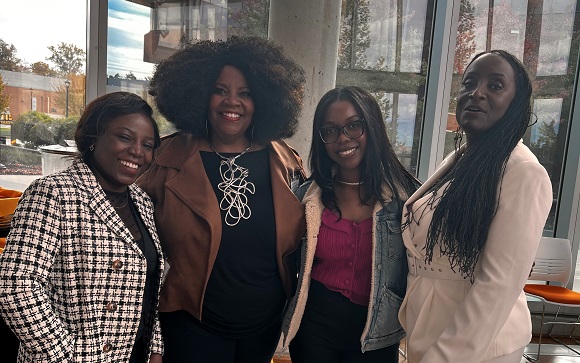Courtesy of Bowie State University
Students in Bowie State’s Human Resource Development program joined graduates and human resources professionals for a symposium on the Future of Work on Nov. 4 to get a better understanding of how artificial intelligence (AI) continues to impact the business of human resources.
The symposium focused on the ways AI is changing how individuals and organizations view human resource development (HRD), disrupting established views of work, talent, skills and roles.
“AI has transformed the workplace,” said Dr. Wendy Edmonds, interim chair in the department of management, marketing and public administration. “The tasks that were performed manually are now done by algorithms and data analytics. People think AI will take away the human factor but it can’t. AI is creating millions of new positions that may require upskilling and reskilling to qualify for the job.”
Edmonds noted that HRD professionals are about talent development and must know how to use AI to help organizations identify and train their workforce. AI is helping HR managers develop better requirements for open positions and enabling greater candidate personalization that can lead to other opportunities for job seekers if they are not selected for a particular position.
More than half of HR professionals report at least one basic skill or knowledge gap among applicants according to the 2022 Talent Trends report from the Society for Human Resource Management (SHRM). The gap cited most frequently was basic computer skills. Predictions show that by 2030, 85 million jobs around the globe will go unfilled because of a lack of skilled workers.
“I came to this symposium to learn more about AI and how to use it in HR applications,” said Brianna Johnson, a 2021 HRD graduate currently employed by Performance Excellence Partners, a human capital consulting firm. “I’m particularly interested in increasing my knowledge of privacy laws and how AI has the potential of reshaping the landscape.”
A white paper published by the World Economic Forum entitled Jobs of Tomorrow: Large Language Models and Jobs identifies trainers, explainers and sustainers as the new emerging positions. Trainers are the engineers and scientists who develop AI and work on large language models on which tools like ChatGPT depend. Explainers are categorized as the individuals who will make AI easy to use for the general public, while sustainers will ensure AI systems are being used properly.
“Attending the event on AI opened my eyes as to where the job market is heading and has given me a better understanding of the technology,” said Allan Stubbs, a current HRD student. “What I learned is that jobs will be lost due to AI, but newer positions will open up that require new skills.”
Sophia Casey, founder and CEO of ICLI RISING, an international coaching, training and leadership development school, spoke to symposium attendees about AI and coaching.
“My company uses AI to co-create training materials and blog articles, learn more about cultures, research and develop products that will assist certified coaches and trainers,” said Casey. “AI saves me and my team a lot of time but it can’t show empathy which is the human factor.”
In addition to Casey, symposium attendees heard presentations from Diya Wynn, ethical AI Master and senior practice manager at Amazon Web Services and Dr. Tamie Santiago, professor of cybersecurity & IT at University of Maryland Global Campus

